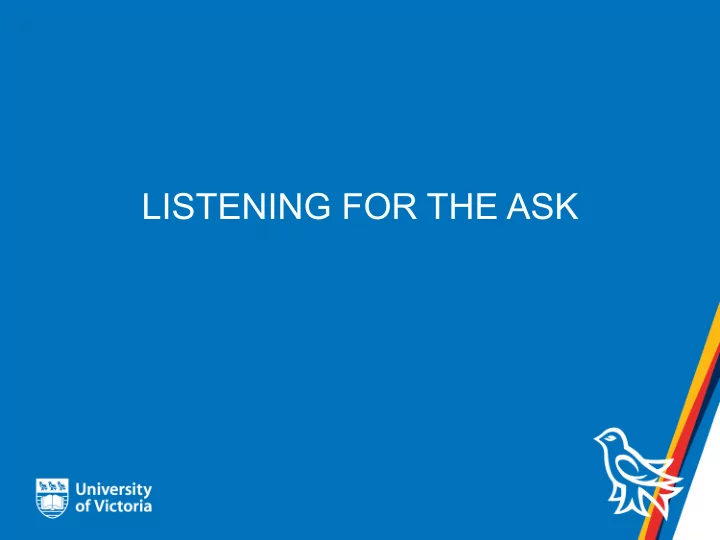

LISTENING FOR THE ASK
Who are we? •Veronica Augustin, BSc, CAPM –Senior Project Manager –University of Victoria •Chandra Beaveridge, BEng, PMP –Manager, PMO, Administrative Operations & Communications –University of Victoria
Agenda •What is Listening for the Ask? –Paradigms & Practices •What prevents us from Listening for the Ask? –Bias •What tools are we using to help us Listen for the Ask?
Have you ever noticed team members make comments or observations, rather than questions? …or you ask a question to your team only to hear a pin drop?
WHAT IS LISTENING FOR THE ASK?
Reframing • Looking for further meaning in what people say by: – asking questions – thinking about bias – encouraging safe spaces • Developing situational awareness • Thinking in context
Shift your paradigms • Assign purpose to comments or observations • Shift from common paradigms to Listening for the Ask paradigms • Challenge your thinking
Listening for the Ask Paradigms Every time a person speaks they are either providing information or making a request. “This came up in the last project”
In the moment Information How I get there There’s a better way “Since the last project, what new insights have been made?” The team is familiar with the work “Could we benefit from quality control, like a checklist to verify steps?” Request How I get there What did we do last time? “Yes, it did. Let’s see what we can learn from the lessons learned” Is there a different way? “Would it benefit us to brainstorm some alternatives?”
Follow up actions • Information shared – Note in project documentation and verify – Develop tools or resources – Parking lot/Future meeting item • Request made – Note decision for leadership/sponsor – Explore and regroup • Brainstorm • Research
Meetings are one way to engage teams…
Get Creative! • Online brainstorming – Email – Project site discussion boards – Wikis and SharePoint • Digital meeting spaces – Video conferencing – Instant messaging/group chat
Preparing to Listen for the Ask Common Practices Listening for the Ask Practices Only structure “big meetings” Structure all meetings Assume everyone knows one Get to know you activities another
Listening for the Ask Common Practices Listening for the Ask Practices Rush through discussion Press pause Rush through decision-making Stay creative and curious Assume effective group Develop group norms dynamics
Listening for the Ask Common Practices Listening for the Ask Practices Ignore mixed signals and expect Squint with your ears questions to sound like questions Expect people speak up if they Develop situational awareness have a concern or notice a problem
WHAT PREVENTS US FROM LISTENING FOR THE ASK?
Bias • Oxford Dictionary definition: Inclination or prejudice for or against one person or group, especially in a way considered to be unfair. • What does bias mean to you?
Bias • Resources: – School of Thought.org • https://www.schoolofthought.org/ • https://yourbias.is • https://yourlogicalfallacyis.com – Project Management Institute • https://www.pmi.org/learning/library/system atic-biases-culture-project-failures-5578
Halo Effect and Framing Effect • How much you like someone, or how attractive they are, influences your other judgments of them. • Yourbias.is • You allow yourself to be unduly influenced by context and delivery. • Yourbias.is
Halo Effect and Framing Effect • Interviews • Presentations • Documentation formatting
Anchoring • The first thing you judge influences your judgment of all that follows. • Yourbias.is
Anchoring • First impressions • Procurement and vendor products • Focused on replacing an existing product rather than actual business requirements for a solution
Confirmation Bias • You favor things that confirm your existing beliefs. • Yourbias.is
Agile Manifesto Individuals and interactions over processes and tools Working software over comprehensive documentation Customer collaboration over contract negotiation Responding to change over following a plan That is, while there is value in the items on the right, we value the items on the left more. (agilemanifesto.org)
Dunning Kruger • The more you know, the less confident you're likely to be. • Yourbias.is
Groupthink • You let the social dynamics of a group situation override the best outcome • Dissent can be uncomfortable, often the most confident or first voice can determine group decisions
Space Shuttle Challenger and Columbia Disasters • Space Shuttle Challenger broke apart shortly after takeoff in 1986 • Space Shuttle Columbia disintegrated upon re-entry in 2003 • Investigations into both disasters revealed that Groupthink played a part – Power distance – Culture unaccepting of criticism – Presentation and interpretation of facts
WHAT TOOLS ARE WE USING TO HELP US LISTEN FOR THE ASK?
Strategies + Tools • Get to know your team: – Introductions – Quick team building games (consider feelings of introverts and extroverts) • Provide agendas • Clarify role with participants and asking if that makes sense to them – I want you to be part of this committee for XYZ reason/observation, does this make sense? Are there other contributions you feel you can make?
THANK YOU! Please connect with us during the conference or send questions or comments to systemspmo@uvic.ca
Resources • How to ask great questions https://www.inc.com/jeff-haden/3-kinds- of-questions-smart-people-never-ask-and-5-they-do.html • Squint with your ears https://www.fastcompany.com/3001537/how- ask-and-listen-you-mean-it • Communication isn’t just talking: https://www.forbes.com/sites/joefolkman/2015/09/08/tell-ask-listen- the-3-steps-to-great-communication-as-a-leader/#166f8ae43a0e • Engage Introverts: https://www.fastcompany.com/3052599/the-top- 3-reasons-introverts-dont-speak-up-in-meetings • 4 Ways Introverts Can Get Heard In Meetings https://www.forbes.com/sites/work-in-progress/2014/06/19/four- ways-introverts-can-get-heard-in-meetings/2/#380ecf2e8a92
Recommend
More recommend